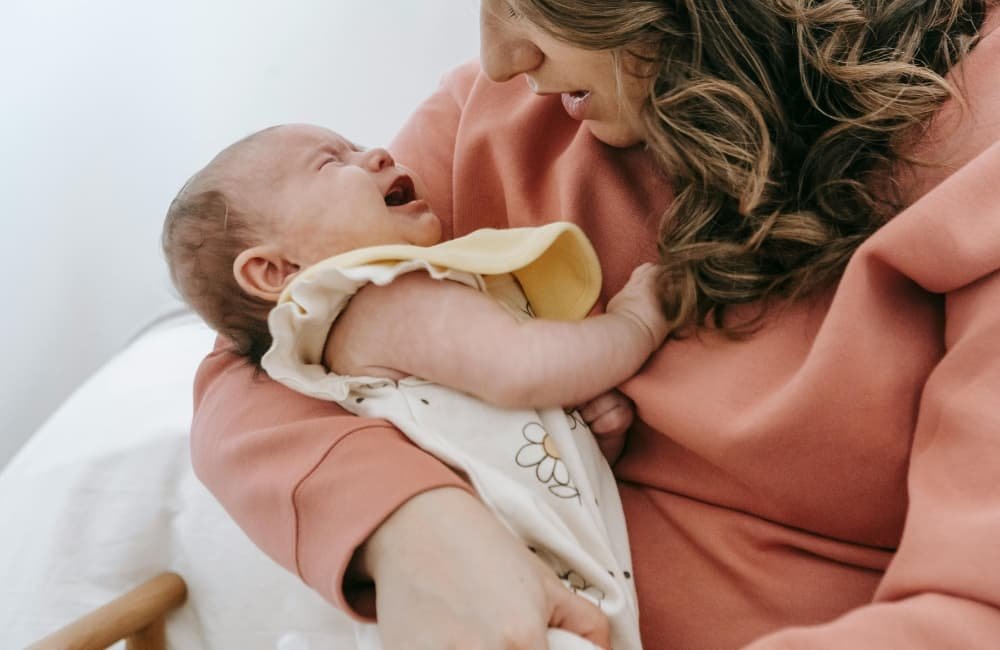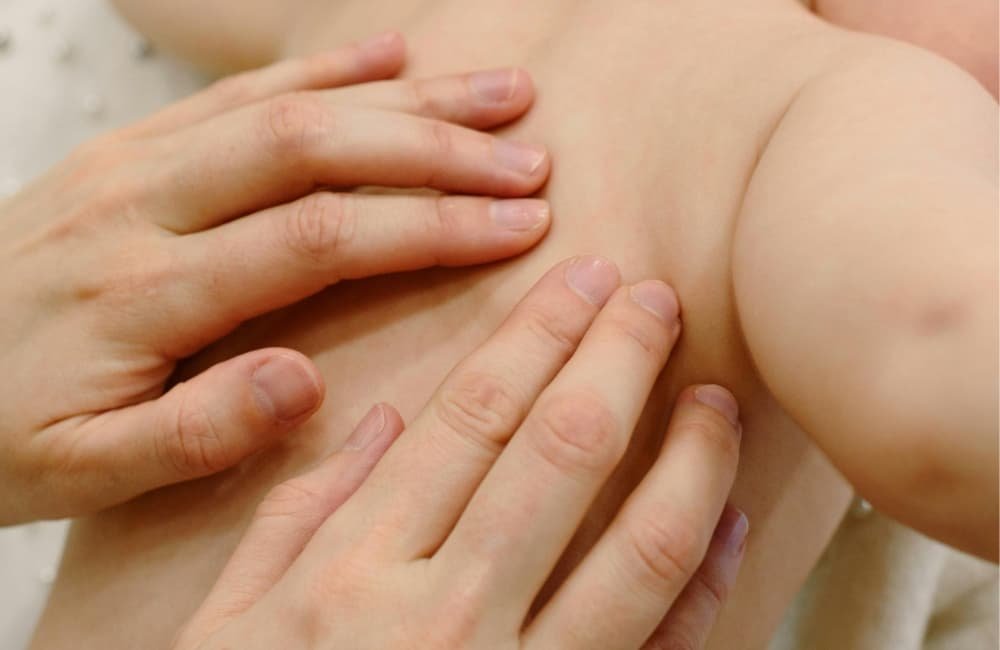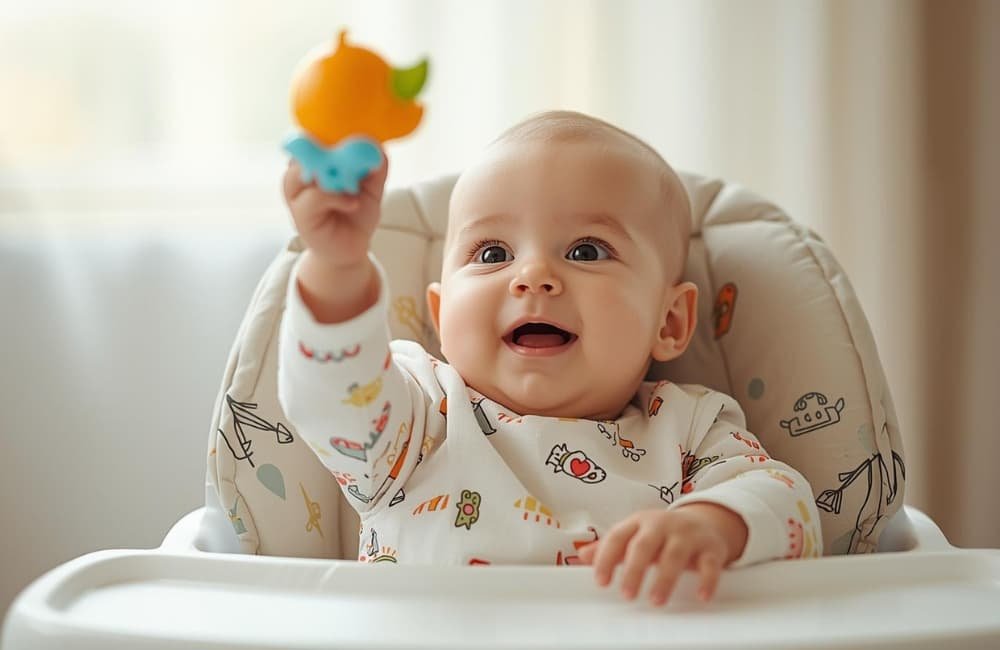Burping is a routine that parents often establish as one of the first things to teach their own baby after feeding. It assists the passage of swallowed air, the avoidance of pain, and the prevention of spit-up. The American Academy of Pediatrics (AAP) states that young babies have additional air to swallow because their digestive systems are still developing, and this is why simple burping during the initial few months is important.
When babies are growing, parents often ask: When should a baby be stopped from burping? Studies indicate that, by 4-6 months, most infants are more efficient feeders, exhibiting greater head and trunk control, which enables them to release gas naturally. However, every infant is different; some infants may take longer to burp, especially when they are susceptible to reflux or when they suck in air during feeding. This is a detailed guide on When Do You Stop Burping a Baby?, when to stop and how to ease the process as your baby matures.
Why Do Babies Need to Be Burped?

Babies not only swallow milk, but they also swallow air when they feed. This air can be trapped, causing fussiness, bloating, or spit-up. Burping helps air pass through and simplifies breathing. Pediatricians recommend breastfeeding as a means of bonding, as well as promoting healthy development in infancy, when the baby’s digestive system is still maturing.
It’s not only depends on whether you are breastfeeding or using formula, but also on the quantities of the feeds. When formula feeding, use the Formula Feeding Calculator to determine the correct amount for your baby’s feedings. Babies’ burping needs change as they grow, since their muscles and digestive systems gradually mature. Here’s a quick look at how burping typically varies by age:
| Baby’s Age | Burping Needs & Notes |
|---|---|
| 0–3 months | Burp your baby during and after most feeds, since young infants swallow the most air. |
| 3–6 months | Continue burping, but babies may need it less often as head and neck control improves. |
| 6–9 months | Many babies can burp independently, though reflux-prone or bottle-fed infants may still benefit. |
| 9–12 months | Many babies can burp independently, although reflux-prone or bottle-fed infants may still benefit from assistance. |
How to Burp a Newborn?
There are several safe and effective ways to burp a newborn:

Over the shoulder
The person is holding the baby upright, with their chin lying softly on their shoulder, supporting the baby, and gently patting the baby’s back.
Sitting on your lap
Hold the baby on your lap, bending forward with one hand at the chest and head, and the other hand rubbing or patting the back.
Lying across your lap
Place the baby lying on their back on your knees, with their head higher than their chest, and rub their back.
When to Stop Burping a Baby?
By the age of 4 to 6 months, most infants no longer require regular burping, as their digestive systems are now more developed and they have better neck and core coordination to expel gas. This may be confirmed by a guide in a magazine called Todays Parent that states that this is the typical age at which people need to stop habitual burping. In a pilot study of burping methods, 74.7% of attempts were successful in different positions, demonstrating the effectiveness of burping but also suggesting that not all sessions might result in a burp.
When Can I Stop Burping My Baby at Night?
The nighttime feeds tend to be slower and less turbulent, i.e., the babies swallow less air. Many parents discover that they can feed their baby at night earlier than they do at daytime feeds, as early as 3 or 4 months. When you can get your baby to feed without crying or without arching the back after feeding, you might be able to put the baby in the crib without a burp. Nevertheless, in cases where your baby has a problem with reflux or spit-up, it may help to continue night burps for a little longer.
When Can Babies Burp Themselves?

Babies learn slowly to burp on their own as they develop. Infants typically achieve this milestone between 4 and 6 months, when they can sit up with assistance and have more control over their head and neck, which reduces the risk of trapped air. At this level, they also naturally expel gas by body movements such as stretching, rolling, or sitting. Parents can also observe that the baby is making fewer burps after feeds, a sure indication of the beginning of self-burps.
What If My Baby Won’t Burp After Feeding?
Babies do not need to be burped during the entire time they are being fed, and this is a natural process. Your baby may not burp at once, so you can always adjust the position, such as from an off-shoulder to a sitting position on their lap, or simply allow the baby more time in the adult pose to allow the air to move naturally. When your baby looks calm and cheerful, you do not need to worry when you take them to bed without burping. However, they can be fussy, gassy, or experience frequent spit-ups, making it a good idea to schedule an appointment with a pediatrician to rule out the possibility of reflux or other digestive issues.
When Can You Stop Burping a Baby with Reflux?
Burping helps eliminate spit-up and alleviate the pain when acid returns to the esophagus, a common occurrence with acid reflux. Parents may alleviate symptoms by burping the baby after each feed, rather than at the end, and leaving the baby seated for 20-30 minutes after feeding. Burping gradually becomes unnecessary as reflux tends to increase with age. Nevertheless, in cases of severe and chronic symptoms, it is advisable to consult a pediatrician.
The following are tips that can be used by parents to help reflux-prone babies:
- Burp often in between feeds, not at the end.
- Keep the baby sitting up for 20-30 minutes after feeding to prevent backflow of acid.
- Give smaller feeds more often than big ones, which can overload the stomach.
- Do not lay the baby flat immediately after a feeding, but support or sit him/her in an upright position.
- Ensure that the latch or bottle angle is set properly to reduce the risk of swallowing excess air.
What Happens If You Don’t Burp a Baby?
There is no harm in occasionally skipping a burp, as some babies simply do not suck in much air and therefore do not need assistance in expelling it. In cases where air does remain trapped, babies may become fussy or cry due to gas pain, and spit-up or a mild degree of reflux may occur. It is not dangerous to miss some of them, but when your baby experiences regular discomfort after feeding, it is your signal that they might even need some normal burping.
Tips for Transitioning Out of Burping
When your baby shows signs of outgrowing the need for burping, you can start easing out of the routine:
- Gradually reduce the number of burping sessions per day.
- Keep your baby upright after feeding to help with the release of natural gas.
- Encourage tummy time and movement, which helps aid digestion and relieve gas.
Over time, your baby will learn to manage without structured burping, making feeding sessions smoother and quicker.
FAQs
The majority of babies should be burped until 4-6 months and some children up to 9 months.
No, you should not burp hard; strong pats can be either painful or cause spit.
Yes, it is not good when there is an unsafe position or an absence of head support; employ mild, assistive techniques.
When it takes too long to burp, switching positions might help; chronic problems might require a pediatric examination.
There are newborns who swallow minimum air; should one feel comfortable, then there is nothing to worry about a missed burp.
ENT specialists or gastroenterologists typically treat this rare condition.
It’s called retrograde cricopharyngeus dysfunction (RCPD), also known as no-burp syndrome.
Conclusion
This is the detailed guide on When Do You Stop Burping a Baby? The majority of babies no longer require burping between 4 and 6 months of age, although others may still need this until the age of 9 months, particularly when bottle-fed or experiencing reflux. As time goes, your baby will naturally progress to assisted burgering to independent and comfortable feeding. Want more expert-backed parenting guides? Follow us for tips on baby milestones, feeding, and growth to support your little one’s journey.


